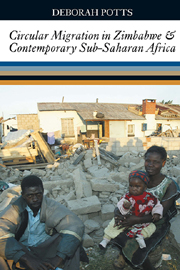Book contents
- Frontmatter
- Contents
- List of Maps, Figures, Tables, Boxes & Photographs
- List of Abbreviations
- Preface
- 1 Introduction
- 2 Regional Paradigms & Approaches to Circular Migration
- 3 Regional Paradigms & Approaches to Circular Migration
- 4 Harare & Zimbabwe
- 5 Migrant Livelihoods & Migration Trajectories in Harare
- 6 Harare Migrants' Rural Links & Assets
- 7 Variations in Migrants' Experience, Perceptions & Options
- 8 Social & CulturalAttachments to Rural Settings & Homes
- 9 Attacking the Urban Poor & Abusing Rural Links Operation Murambatsvina 2005
- 10 Conclusion
- Appendix: Consumer Price Index (all items) for Urban Families 1973–2007
- Bibliography
- Index
2 - Regional Paradigms & Approaches to Circular Migration
Tropical Africa
Published online by Cambridge University Press: 05 July 2013
- Frontmatter
- Contents
- List of Maps, Figures, Tables, Boxes & Photographs
- List of Abbreviations
- Preface
- 1 Introduction
- 2 Regional Paradigms & Approaches to Circular Migration
- 3 Regional Paradigms & Approaches to Circular Migration
- 4 Harare & Zimbabwe
- 5 Migrant Livelihoods & Migration Trajectories in Harare
- 6 Harare Migrants' Rural Links & Assets
- 7 Variations in Migrants' Experience, Perceptions & Options
- 8 Social & CulturalAttachments to Rural Settings & Homes
- 9 Attacking the Urban Poor & Abusing Rural Links Operation Murambatsvina 2005
- 10 Conclusion
- Appendix: Consumer Price Index (all items) for Urban Families 1973–2007
- Bibliography
- Index
Summary
Introduction
Chapter 1 established how circular migration in developing countries has been covered in general migration theory. This chapter and the next explore some of the ways in which it has been evaluated in sub-Saharan Africa and, in particular, how different academic approaches and theoretical positions have shaped these evaluations in different regions. The focus is on academic assessments in the postcolonial period, particularly from the 1970s, when changes in migration patterns facilitated by policy changes introduced at independence had become reasonably apparent in West, East and Central Africa, although not in southern Africa. At that point, four southern Africa countries (Angola, Mozambique, Namibia, Rhodesia) had not achieved independence and, along with South Africa, remained under white settler rule. Three others, Botswana, Lesotho and Swaziland, achieved independence only in the late 1960s and were also so bound into the South African migrant labour system that their migration processes were still dominated by South African policy. The other two southern African countries, Malawi and Zambia, became independent in1964 and experienced similar policy changes to those further north. During the colonial period, the academic analysis of urbanization and migration in Zambia (then Northern Rhodesia) had exerted influence over Anglophone urban studies throughout sub-Saharan Africa, due to the important urban-based anthropological studies of the Rhodes-Livingstone Institute (RLI) based in that country.
- Type
- Chapter
- Information
- Publisher: Boydell & BrewerPrint publication year: 2010



